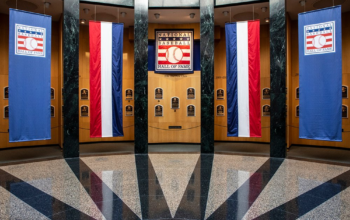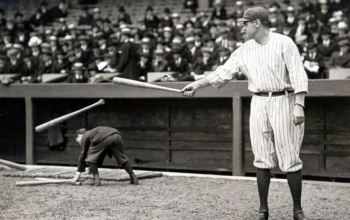
A New York Yankee for his entire 20-season career in Major League Baseball, Derek Jeter stands out as one of the greatest shortstops and leaders in baseball history. Jeter helped lead the Yankees to five World Series championships while cementing his reputation as a consummate professional and team-first player. Known for his competitiveness, poise, and clutch hitting, Jeter served as the Yankees’ captain from 2003 until his retirement in 2014. He finished his career with 3,465 hits (sixth all-time), a .310 career batting average, and strong defensive skills that earned him five Gold Glove awards. Revered by teammates and opponents alike, Jeter combined exceptional talent with an understated style and unwavering commitment to winning. His career exemplified the ideal of a Yankee – class, professionalism, and championships above all else. Though individual accolades piled up for Jeter, he always put the team first, inspiring those around him and representing the mythical aura of Yankee greatness.
Early Life and Amateur Career
Derek Jeter was born on June 26, 1974 in Pequannock, New Jersey. As a child, Jeter developed a love for baseball, often playing catch with his parents. Jeter attended Kalamazoo Central High School in Michigan, where he played baseball and basketball.
On the baseball diamond, Jeter made a name for himself with his athleticism, leadership, and clutch performances. As a senior in 1992, Jeter batted .508 and compiled 23 RBIs, 21 walks, 4 home runs, and just 1 strikeout. His outstanding play garnered many accolades, including the USA Today High School Player of the Year.
After graduating high school in 1992, Jeter received a baseball scholarship to attend the University of Michigan. However, he chose to turn professional instead, signing with the New York Yankees after being selected sixth overall in the first round of the 1992 MLB draft.
Jeter’s success as an amateur player foreshadowed his illustrious professional career in baseball. His talent and intangibles were evident from an early age.
Drafted by the Yankees
Derek Jeter was selected by the New York Yankees in the first round of the 1992 MLB Draft with the 6th overall pick. Coming out of high school in Kalamazoo, Michigan, Jeter had committed to play college baseball for the University of Michigan. However, the Yankees saw tremendous potential in the young shortstop and selected him with their top pick.
Jeter and his family negotiated with the Yankees, and he ultimately signed with the team on June 27, 1992, foregoing his college eligibility. The Yankees gave Jeter a signing bonus of $800,000 to start his professional baseball career in their organization. At the time, team owner George Steinbrenner saw Jeter as a future contributor to the Yankees’ success.
Drafting Jeter marked a pivotal moment for the storied franchise. He would go on to become one of the team’s most celebrated players and a key member of their late 1990s dynasty that won 4 World Series championships in 5 years. Jeter spent his entire 20-year MLB career with the Yankees, cementing his legacy in pinstripes. The Yankees’ 1992 draft selection of Jeter proved to be one of the most important draft picks in the team’s illustrious history.
Debut and Early Career
Jeter was assigned to Class A Tampa of the Florida State League to begin the 1994 season before being promoted to the AA Albany-Colonie Yankees of the Eastern League. He switched from uniform number 2 to No. 17 during his tenure with Albany to avoid the Yankees’ No. 2 that was worn by starting shortstop Tony Fernández at the major league level. He batted .344 with five home runs, 68 runs batted in and 50 stolen bases in 127 games at Albany, and was selected as an All-Star in the Eastern League and ranked the league’s seventh-best prospect by Baseball America. He earned a late season promotion to Class AAA Columbus Clippers of the International League after Fernández was injured in September 1994. Jeter made his professional baseball debut with the Clippers during their postseason run. The Clippers lost to the Rochester Red Wings in the ICL Championship Series. He finished his first professional season with a .344 batting average, a .417 on-base percentage, and a .467 slugging percentage between the three minor league teams.
Jeter started the 1995 season with Columbus. Despite starting the year with a .167 batting average in April, he was promoted to the major leagues on May 29, 1995 to replace injured starter Tony Fernández. At age 20, Jeter debuted at the Kingdome in Seattle, and went hitless in five at-bats, going 0-for-5 against the Mariners, while making several impressive defensive plays. He recorded his first career hit on May 30 against the Mariners’ Tim Belcher. Jeter batted .250 and committed two errors in 13 games before being demoted to Columbus on June 11 when Fernández returned from his injury. The Yankees advanced to the postseason in 1995 but lost to the Seattle Mariners in the 1995 American League Division Series.
Jeter was named Opening Day shortstop entering the 1996 season, the Yankees’ first season since 1981 without team captain Don Mattingly. He batted .314 with 10 home runs, 78 runs batted in, and 104 runs scored. Jeter had the second-highest batting average among shortstops in the AL, behind Alex Rodriguez who batted .358 for the Mariners, though both were selected to the 1996 All-Star Game. During the 1996 season, he was selected as the American League Rookie of the Year by both Sporting News and by the BBWAA and finished third in AL MVP voting behind Juan González and Alex Rodriguez. The Yankees again made the postseason in 1996; Jeter batted .361 in the 1996 American League Division Series against the Texas Rangers, and batted .417 in the 1996 American League Championship Series against the Baltimore Orioles. His defense was recorded at +0.7 dWAR in 1996 according to Baseball Reference. The Yankees defeated the Atlanta Braves in the 1996 World Series, which began Jeter’s reputation as a clutch postseason performer.
Championship Seasons
Jeter was part of the Yankees dynasty that won four World Series championships in five years. In 1996, he was the starting shortstop for the Yankees team that won the World Series against the Atlanta Braves. Jeter batted .361 in the 1996 postseason and was named the World Series MVP.
In 1998, the Yankees swept the San Diego Padres to win the World Series with Jeter as their starting shortstop once again. The following year in 1999, the Yankees faced the Braves again in the World Series, defeating them in four games for back-to-back titles. Jeter contributed with a .353 batting average in the 1999 postseason.
In 2000, the Yankees faced their cross-town rivals, the New York Mets, in the first “Subway Series” since 1956. Jeter led the Yankees to their third consecutive championship in a five-game World Series win over the Mets. This cemented the Yankee dynasty and Jeter’s legacy as a championship performer.
Statistical Achievements
Derek Jeter enjoyed a 20-season career with the New York Yankees that cemented his place as one of the greatest offensive shortstops in baseball history. While defensive metrics rated Jeter as just an average fielder, his prowess at the plate was undeniable. Jeter compiled a .310 career batting average, the 6th highest of all time amongst players with at least 3,000 career hits. He tallied 3,465 hits in his career, good for 6th on the all-time hits list. Jeter was also renowned for his power at the shortstop position, clubbing 260 home runs while playing for the Yankees. For his career, Jeter produced an OPS+ of 115, indicating he was 15% better than the league average hitter. Jeter’s blend of average and power from the shortstop position enabled him to produce 1,923 runs scored and 1,311 RBIs over his illustrious career.


